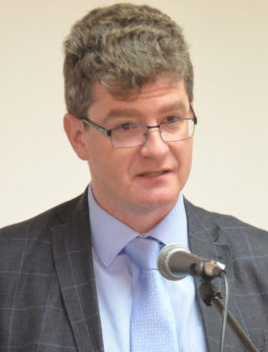As the United Kingdom continues to monitor Guyana’s compliance with the rulings of the Caribbean Court of Justice (CCJ), High Commissioner Gregory Quinn has once again stressed adherence to the rulings.
“The CCJ made clear what all of the parties had to do and they pointed towards their constitutional requirements and I think that everybody needs to be clear that they need to sit down and do what their Supreme Court has told them to do,” Quinn told Stabroek News on the sidelines of a maritime sector consultation at his residence yesterday.
He added that it was not his job to interpret the constitution and noted that the CCJ made its rulings clear.
“…The CCJ has done its job. As we said last week, the A,B, E [countries—America, Britain and the EU Delegation], it is for the invoked actors to ensure they are doing what is needed and adhere to what the CCJ said. That is where we are,” he noted. “Everybody should know what to do, so they need to do it,” he added.
It has been almost two weeks since the CCJ issued its consequential rulings, based on its findings that the December 21st, 2018 vote of no-confidence against the APNU+AFC administration was validly passed, thereby requiring elections, and that the Chairman of the Guyana Elections Commission (GECOM) was unlawfully appointed, thereby requiring a new appointment to be made.
According to the court, upon the passage of the motion of no-confidence against the government, the clear provisions of Article 106 (6) of the Constitution immediately became engaged.
It further noted that the meaning of Article 106(6) and (7) is clear and it is the responsibility of constitutional actors in Guyana to honour them.
“Upon the passage of a vote of no confidence, the Article requires the resignation of the Cabinet including the President. The Article goes on to state, among other things, that notwithstanding such resignation the Government shall remain in office and that an election will be held within 3 months or such longer period that the National Assembly by resolution supported by not less than two-thirds of the votes of all elected members of the National Assembly…,” the court stated, before adding that “the Guyana Elections Commission has that responsibility to conduct that elections and GECOM too must abide by the provisions of the Constitution.”
In delivering the order, CCJ President Justice Adrian Saunders had expressed the hope that “bodies and personages will exercise their responsibilities with integrity and in keeping with the unambiguous provisions of the Constitution bearing in mind that the no-confidence motion was validly passed as long ago as 21 December 2018.”
Although efforts have been made by President David Granger and Opposition Leader Bharrat Jagdeo to engage on possible nominees for the post, both sides have signalled differing interpretations of their responsibilities based on the CCJ’s ruling.
Asked if the United Kingdom was concerned about the gridlock as it pertained to the appointment of a GECOM Chairperson, Quinn said, “The fundamental thing here is that it is in everybody’s interest for us to get to a resolution of the GECOM Chairman and to get to a resolution on what happens following the no confidence vote.”
Pressed on if the UK was monitoring compliance with the ruling of the CCJ and the constitution of Guyana, he further added, “It is what we do all the time. It is what we do locally and it is in all of our interest to ensure that the CCJ as the Supreme Court is adhered to.”
He reiterated that both government and opposition need to obey the ruling but did not go further as to what would be the repercussions if they failed to do so. “They have been given a very clear steer by the CCJ, which says that the constitution explains what all of the parties need to do and that the CCJ expects them to do what are their constitutional responsibilities,” Quinn said. “I think all of the parties need to do what the CCJ, which is ultimately the Guyana’s Supreme Court, says that they need to do,” he added.






